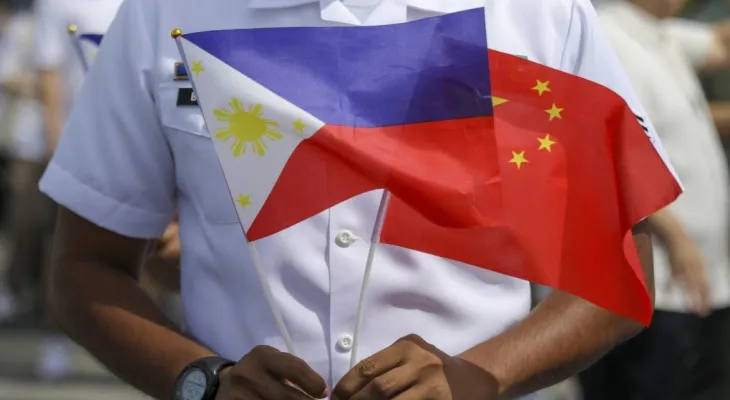Search here
Newspaper
Search here

Arab Canada News
News

Published: July 21, 2024
The Philippine government announced on Sunday that China and the Philippines have reached an agreement that they hope will end the confrontations in the most disputed shallow waters of the South China Sea.
The Philippines occupies the Second Thomas Shoal, but China also claims it, and the increasing hostile clashes at sea have raised fears of larger conflicts that could involve the United States.
The crucial agreement was reached on Sunday, following a series of meetings between Philippine and Chinese diplomats in Manila and the exchange of diplomatic notes aimed at establishing an acceptable arrangement for both parties in the shallow waters without relinquishing territorial claims from either side.
Two Philippine officials, familiar with the negotiations, confirmed the deal to the Associated Press on the condition of anonymity, and the government later issued a brief statement announcing the deal without providing details.
The Department of Foreign Affairs in Manila stated that both sides continue to recognize the need to de-escalate the situation in the South China Sea and manage disputes through dialogue and consultation, agreeing that the agreement would not affect each other's positions in the South China Sea.
China faces disputes with several governments over land and maritime borders, many of which are in the South China Sea, and the rare agreement with the Philippines may raise hopes that Beijing can craft similar arrangements with other rival nations to avoid clashes amid unresolved contentious regional issues. However, it remains to be seen whether the agreement can be successfully implemented and how long it will last.
Chinese coast guards and other forces have used powerful water hoses and dangerous blockading maneuvers to prevent food and other supplies from reaching Philippine Navy personnel at a Manila settlement site in the shallow waters.
The ongoing regional confrontation in the shallow waters has flared repeatedly since last year between the Chinese coast guard and navy, suspected militia vessels, and Philippine coast guard-accompanied navy boats transporting food and water to a settlement site on the grounded and rusty warship BRP Sierra Madre.
In the worst encounter, Chinese forces aboard speedboats repeatedly rammed two Philippine Navy boats and boarded them on June 17 to prevent Filipino personnel from transporting food and other supplies, including firearms, to the vessel's site in the shallow waters, according to the Philippine government.
Following the repeated collisions, the Chinese seized the Philippine Navy boats and damaged them with makeshift sabers and spears. They also confiscated seven M4 rifles that were packed in boxes and other supplies. The violent confrontation resulted in injuries to several Philippine Navy personnel, including one who lost his thumb, in chaotic skirmishes captured in videos and photos later released by Philippine officials.
China and the Philippines exchanged accusations of responsibility for the confrontation, with each asserting its sovereign rights over the shallow waters, which the Filipinos refer to as Ayungin and the Chinese call Ren'ai Jiao.
The United States and key Asian and Western allies, including Japan and Australia, condemned China's actions in the shallow waters, calling for respect for the rule of law and freedom of navigation in the South China Sea, a major global trade route with rich fishing grounds and undersea gas deposits.
In addition to China and the Philippines, Vietnam, Malaysia, Brunei, and Taiwan are engaged in separate but increasingly tense territorial disputes in the waterway, which is seen as a potential flashpoint and a delicate fault line in the regional competition between the U.S. and China. The U.S. military has deployed navy ships and fighter aircraft for decades in what it calls freedom of navigation and overflight patrols, which China opposes and views as a threat to regional stability.
Washington has no territorial claims in the disputed waters but has repeatedly warned that it is obligated to defend the Philippines, its oldest ally in Asia, if Philippine forces, ships, and aircraft come under armed attack, including in the South China Sea.
One Philippine official stated that the confrontation on June 17 prompted Beijing and Manila to accelerate intermittent talks about an arrangement that would prevent clashes in the Second Thomas Shoal.
During the final meetings in the past four days, two Chinese demands that had been major sticking points were removed from the draft agreement.
China had previously stated that it would allow the Philippines to transport food, water, and other essential supplies to its forces in the shallow waters if Manila agreed not to bring construction materials to fortify the grounded vessel, giving China prior notice and the right to inspect. Officials said they were inspecting the vessels for those materials.
The Philippines rejected those conditions, which were not included in the final agreement.
Comments